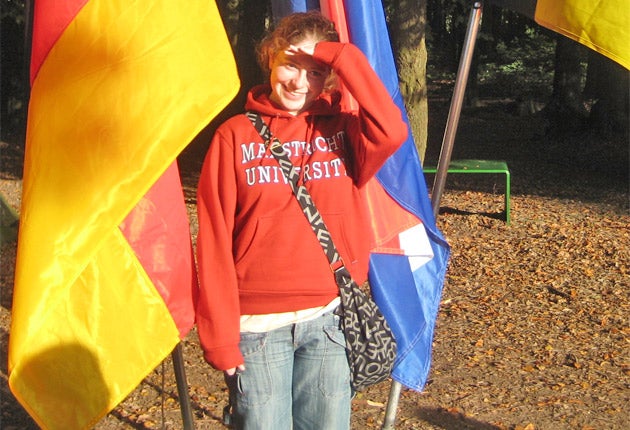Why British students are choosing to go Dutch
Low fees and better job prospects are behind a tenfold leap in UK applications to Maastricht University

The fees are lower and job prospects are considerably better, so it is little wonder that those who have already made the choice describe it as a "no brainer".
More than 400 school leavers plan to desert the British university system and head for Maastricht University in the Netherlands this autumn – 10 times the number who did last year.
Charles Waciuma, 23, from Reading, who will be starting an International Business degree this September, is one of them. "It would be wrong to say that fees have not played a part in my decision," he said, and he is not alone.
With the prospect of tuition fees rising to £9,000 a year in many English universities from September 2012, Mr Waciuma predicted that many others would follow in his footsteps next year. As he had been working for a few years since leaving school, the prospect of running up serious debts at university was not an appealing one.
Colin Behr, 23, from Devon, who is in the second year of a European studies degree at Maastricht, said: "It's not only the £9,000 fee but the cost of living accommodation, too. Here it would only be a modest debt."
The fees rise is not the only thing driving the UK student exodus. Theresa Bullock, 19, studying knowledge engineering, is from Edinburgh and would presently receive free tuition courtesy of the Scottish government.
"My parents thought I was mad when I opted for a university that was charging fees," she said, adding that she was swayed by the quality of the course and the chance to study overseas. Maastricht's current fees are £1,550 a year compared with a top-up fee level in England of £3,240.
Ms Bullock also pointed out that the Government's spending squeeze on social sciences and the humanities was putting some students off. Funding for teaching in these areas is to be completely withdrawn as they rely on fees income for their survival.
Another attraction is the fact that 85 per cent of Maastricht graduates are in a decent job within a year of leaving university. The students receive a grant from the Dutch government equivalent to €260 (£232) a month if they decide to work 32 hours a week while they study. Ms Bullock delivers post and also works in the university's communications department, while Mr Behr works in a call centre.
There is, however, what some students may consider a downside. Maastricht sets high standards from the very first year of its courses and anyone not meeting them is asked to leave.
Under Dutch law, the university must accept all applicants who get the necessary qualifications – there is no turning away of thousands of students with straight A grades at A-level as happens at Oxford and Cambridge. A rigorous check on whether the student is up to the standards demanded by the course after they have enrolled is a way of keeping a lid on numbers.
Martin Paul, the president of the university, said: "It's not ruthless. We do offer counselling and help and the possibility of an alternative course that may be more suitable to their needs."
Maastricht has been an architect of its own success in recruiting UK students, sending representatives to a series of sixth-form careers days over the past year. One of its British team members is currently in the process of visiting 25 schools.
She said that on her travels she often meets rival recruiters from Harvard and Princeton universities in the United States – a further sign that overseas institutions are keen to raise their numbers of British students.
Maastricht is installing a fast-track admissions scheme for prospective UK students this year, which goes live during the clearing period after they have received their A-level grades.
Further forays into the UK are being planned for the autumn term, as student minds are concentrated by the impending fees rises. "I think [British universities] think we're smart," said Mr Paul. "Taking 400 applications is not going to have that much impact on UK universities' recruitment. It is a small number when compared with the whole."
"Smart" is also a term applied to the university, which was only founded in 1976, when it changed its name from the university of Lindberg after the signing of the Maastricht Treaty. "We thought Maastricht would be a name that people remembered," said Mr Paul, "rather than a German cheese."
Maastricht is a university town like Cambridge – there are 15,500 students in a town of 120,000 inhabitants.
Academics at the university cite its "problem-based" method of studying as the key reason behind its recruitment success. In one example The Independent witnessed, two groups of students were told to prepare separately for a debate on the effectiveness of organisations such as the IMF and the World Bank and were given a pass or fail based on their presentations.
"I like to call it the Dr House school of learning," said Mark Stout, co-dean of University College Maastricht, in a reference to Hugh Laurie's eccentric TV medic, who favours a hands-on approach. "Problem solving," said one academic, "is better than sitting or not sitting in a lecture hall for three hours."
Join our commenting forum
Join thought-provoking conversations, follow other Independent readers and see their replies
Comments
Bookmark popover
Removed from bookmarks